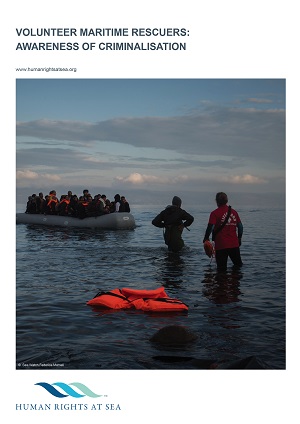New Criminalization Advice for Volunteer Rescuers and Masters
Recent European media reports have suggested that volunteer maritime rescuers may be criminalized under legislation previously established to combat people smuggling. Therefore, the independent maritime human rights charity, Human Rights at Sea, has published new independent guidance for volunteer maritime rescuers on the risks of criminalization when facilitating rescues at sea.
The free guidance is applicable to ship masters, NGOs and civil society organizations.
 The guidance examines the current E.U. legislation as volunteer maritime rescuers have expressed concerns about how it might appear to criminalize their humanitarian work. It also reviews the duties that apply to all vessel masters and highlights the international obligations that require States to support Search and Rescue (SAR) operations within their maritime areas of responsibility.
The guidance examines the current E.U. legislation as volunteer maritime rescuers have expressed concerns about how it might appear to criminalize their humanitarian work. It also reviews the duties that apply to all vessel masters and highlights the international obligations that require States to support Search and Rescue (SAR) operations within their maritime areas of responsibility.
The new publication comes against the backdrop of the European Union Agenda on Migration. It reflects work undertaken by the E.U. Committee on Civil Liberties, Justice and Home Affairs including developing safe and legal routes for asylum seekers and refugees into the E.U. It additionally reflects concerns recently raised by the European Community Shipowners' Associations that private ship masters and NGOs who genuinely assist persons in distress at sea should not risk punishment for providing search and rescue assistance.
The guidance has been reviewed and endorsed by the International Maritime Rescue Federation (IMRF). IMRF has consultative status at the IMO and is the only organization at the IMO solely focused on improving maritime search and rescue. The IMRF works closely with IMO member States and the Secretariat to complete the Global SAR Plan, the essential network of facilities for maritime SAR coordination across the world to provide a consistency of communication and response.
Bruce Reid, CEO, IMRF, said: "The International Maritime Rescue Federation is delighted to endorse the excellent guidance provided in this document by Human Rights at Sea. We are fully supportive of the information provided and believe this will be of great assistance to volunteer maritime rescuers, both now and in the future, as they venture out to help prevent loss of life. The only competition SAR organizations should face in maritime rescue is with the elements. We at the IMRF believe that cooperation, locally, nationally and internationally, is the key to preventing loss of life in the world’s waters. We are grateful to the team at Human Rights at Sea for developing this guidance and making it freely available to all rescuers."
David Hammond, CEO, Human Rights at Sea, commented: "Potential criminalization of individuals acting to save life is a topic that has been urgently raised with the charity, so we have responded quickly and accordingly."
The guidance is available here.
